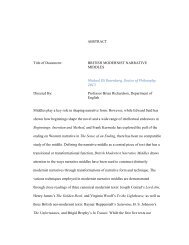PSYCHOTHERAPY ENGAGERS VERSUS NON-ENGAGERS
PSYCHOTHERAPY ENGAGERS VERSUS NON-ENGAGERS
PSYCHOTHERAPY ENGAGERS VERSUS NON-ENGAGERS
You also want an ePaper? Increase the reach of your titles
YUMPU automatically turns print PDFs into web optimized ePapers that Google loves.
does not provide restatements, reflections, or interpretations; and does not provide<br />
information relevant to the treatment of the client’s problems.<br />
Cavanagh and Levitov (2002) also discussed intake sessions. They located intake<br />
interviews as part of the information-gathering stage among six stages of counseling:<br />
Therapeutic Alliance (Stage 1), Information Gathering (Stage 2), Evaluation and<br />
Feedback (Stage 3), Counseling Agreement (Stage 4), Change(s) in Behavior (Stage 5),<br />
and Termination (Stage 6). They stated that an intake interview is one of the most<br />
common ways of obtaining information from clients, and that the intake process may take<br />
three sessions (gathering information, making diagnoses and formulating treatment<br />
recommendations). They noted that closed questions can be efficient and direct, but can<br />
limit the amount of information gathered: “the posing of specific questions illuminates<br />
some aspects of the client’s life but leaves others in darkness” (p. 27). In contrast, open<br />
questions that are non-directive allow more of the client’s values and priorities to surface,<br />
and allow clients to provide the information in the way that is most meaningful to them,<br />
rather than in a form structured by the counselor. Closed questions may be necessary to<br />
obtain specific, important pieces of information (for example, with a potentially suicidal<br />
client, asking whether a client has weapons in his/her home), whereas open questions<br />
may allow clients to explore their thoughts and feelings about their issues in more depth.<br />
Based on Cavanagh and Levitov (2002), I surmise that the basic tasks of the<br />
initial intake session might involve alliance-building (Stage 1), information gathering<br />
(Stage 2), as well as making diagnoses and formulating treatment recommendations.<br />
Alliance-building could involve restatements, reflections, self-disclosure of facts<br />
enhancing a counselor’s credibility, approval-reassurance, interpretations, information in<br />
46

















